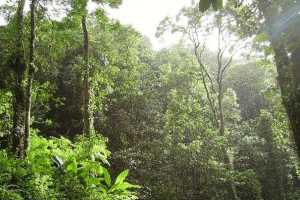Ghana to launch REDD+ options to address deforestation and degradation
 Dr Augustus Asamoah, Principal Project Manager of Proforest has announced that the government was set to launch the Ghana National REDD+ Strategy Programme.
Dr Augustus Asamoah, Principal Project Manager of Proforest has announced that the government was set to launch the Ghana National REDD+ Strategy Programme.
He said as part of efforts to reduce expansion of agroforestry, tree crops, biofuels and agro-industries, improved the quality of multi-stakeholder dialogue and decision making, and to mitigate effects of agricultural expansion, particularly cocoa, oil palm, rubber and timber the launch of REDD+ strategy programme would address that.
Dr Asamoah explained that concerns have been raised over the myriad of environmental and social challenges associated with agriculture and forestry commodity production, with calls on national governments and supply chain companies to put in place adequate measures to address the challenges.
Dr Augustus Asamoah made this known at the side-lines of a Stakeholders Sensitisation Workshop on Engagement Principle for Production Landscape Initiatives in Takoradi.
The workshop was attended by District Directors of Agriculture, staff of the Ghana Cocoa Board and the Forestry Commission.
He said the government has put in place policy and processes to help address the issues inherent in commodity production, whilst supply chain companies have developed corporate policies and voluntary market standards that commit them to production systems that were environmentally sustainable and socially responsible.
He further explained that the Production Landscape Programme in Ghana was a three-year programme that started in July 2018 and have been implemented in Ghana, Liberia, Cameroon and Indonesia with focus on addressing deforestation, small holder inclusion, gender, child and forced labour in four commodities made up of cocoa, oil palm, rubber and timber production landscapes, with the Western and Western North Regions as the Pilot Landscape.
The four commodities, he said accounted for about 20% of Ghana’s GDP but were partly responsible for the high rate of deforestation within the agro-forest mosaic in Ghana.
He said the Proforest’s Production Landscape Programme (PLP) funded by the Department of Foreign and International Development (DFID) of the British government was to develop guidance on Engagement Principles to help supply chain companies aligned with national and subnational policy processes.
He said the Engagement Principles sought to provide information on the available national and subnational policy processes and initiatives with which private supply chain companies could align to address environmental and social challenges in agro-commodity production landscapes.
It can also assist supply chain companies and organizations to forge closer collaboration to address challenges that have characterised the production of forest-risk agro-commodities.
According to him, the production of cocoa, oil palm, rubber and timber in Ghana were partly responsible for the high deforestation rate of 3.2% per annum within the agro-forest mosaic landscape.
“Over the past decades, deforestation and forest degradation in Ghana’s agro-forest mosaics has been driven by low-yielding, expansive commodity agriculture, coupled with the progressive growth of other extractive industries.”
Dr Asamoah noted that the environmental and social issues associated with agro-commodity production were not restricted to only one community or farmers within a restricted area, but very often, widespread throughout the production landscape, which required interventions that transcended supply sheds for maximum impact.
He pointed out that issues such as deforestation, child labour, gender inequality, disease outbreak required change across the landscape to be effective, hence, companies needed to collaborate with other organisations through landscape or jurisdictional approaches, and sector-wide initiatives to achieve positive impact.
Source: GNA
